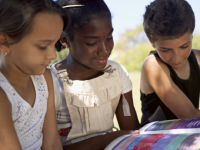Make Literacy a Focus of PBL
What's the role of literacy in project-based learning? It's hard to imagine a project, in any subject area, that doesn't involve the essential skills of speaking, listening, reading, and writing. That was the overwhelming message from participants in a recent Twitter chat about PBL and literacy (#IRAchat, hosted by the International Reading Association).
"Asking questions, reading with a question in mind, summarizing-not sure you could do PBL without including literacy skills," said instructional coach Sue Brusco (@bruscos).
As they take part in project experiences, students apply a range of literacy skills, such as "navigating a variety of texts, developing visual literacy skills, communicating new learning effectively," added Shawna Coppola (@ShawnaCoppola), an elementary literacy specialist.
Across the arc of a project -- from entry event to final presentation -- teachers can find opportunities to deepen students' literacy skills. They may also encounter challenges that will require deliberate scaffolding and troubleshooting.
"The best PBL literacy experiences," according the Myla Lee (@MyTLee3), a PBL coach and fellow member of the Buck Institute for Education National Faculty, "are where students are the creators, question askers, builders, and presenters of the written word." Here are some expert tips and recommended resources to help realize that vision.
Find the Right Texts
PBL puts students in the role of active inquirers. Their literacy skills get a workout in the process of asking good questions and seeking answers through research, interviews, observation, and other forms of investigation that may involve critical reading and careful listening.
How can teachers scaffold the research phase of a project for diverse learners? "The biggest challenge is finding a variety of reliable texts (written texts especially) that are accessible for all types of readers," acknowledges Shawna Coppola (@ShawnaCoppola).
Here are two resources recommended during #IRAchat to help curate reading materials and ensure that all students are actively engaged as readers and critical thinkers:
- Newsela offers a menu of nonfiction articles from daily news sources, presented at five different reading levels. That means diverse readers, grades 3-12, can read about -- and be better prepared to think critically about -- timely issues such as climate change, Supreme Court decisions, or the public health response to Ebola
- CommonLit offers teachers a free collection of articles of articles, short stories, poems, and historical documents, organized into cross-cutting themes such as "Justice, Freedom, and Equality." Intended for middle-school readers, materials are sorted into three reading levels. That means all students can engage with texts and contribute to discussions and other project activities. Stephanie Cardella (@cardella112) applauded the site's focus on "big ideas in text"
Leverage Tried-and-True Approaches
Many effective literacy techniques fit seamlessly into PBL. I've seen projects that incorporate readers' theater, literature circles, and writers' workshop, to name a few. "Workshop is a great structure that supports PBL," adds Myla Lee. "It is one way to help manage PBL daily."
The shift for many literacy teachers is thinking about when these practices best fit into the timeline of a project. When planning a project, ask yourself when students will have a specific "need to know," such as understanding a challenging text or developing an effective oral argument. Then plan for the appropriate literacy instruction to help them succeed.
Teach Discrete Skills
Support students by helping them master the specific skills that will contribute to project success.
That may mean a lesson on listening, says @SaraAnn2860, "because it truly is a skill that needs to be taught."
Peer critique, a staple of writers' workshop as well as PBL, is a process that students will need to learn through modeling and practice. "Even at the Kindergarten level," says @SaraAnn2860, students can learn to provide constructive criticism. (Veteran educator Ron Berger shows what that looks like in this popular video, "Austin's Butterfly.")
"Guiding students in evaluating sources" is an explicit PBL goal for @MayShasta. (This post offers some strategies to help.)
Allow for Student Voice and Choice
Giving students voice and choice in PBL helps to increase engagement. When the focus is on literacy, voice and choice might mean "different genres around a common theme," suggests Ashley Roberts (@_my3boys). Julie May (@MayShasta) adds, "PBL gives ALL my students a seat at the table." For @SaraAnn2860, "meaningful learning is self-selected and personally driven to meet individual needs." Digital tools can expand the options for what students choose to produce and how they choose to engage with their audience.
Learn from Examples
What does PBL with a literacy focus look like in practice? The options are practically unlimited, but here are a few that illustrate the possibilities.
Amy Conley (@AmyKConley) advocates for PBL that is "service-based, student-driven, and all about inquiry." She shared an example in her recent blog post. Here's another example of writing as service, featured at the National Service-Learning Conference.
High Tech High shares seasoned advice on literacy in PBL, along with project examples.
Peacekeepers of Chicago, a seventh-grade project from Polaris Charter Academy, is an example of students reading, researching, writing, and publishing to accomplish a meaningful, authentic purpose--building a more peaceful community.
Literacy Today has curated more resources about PBL and literacy, including "Super Practical PBL Ideas."
